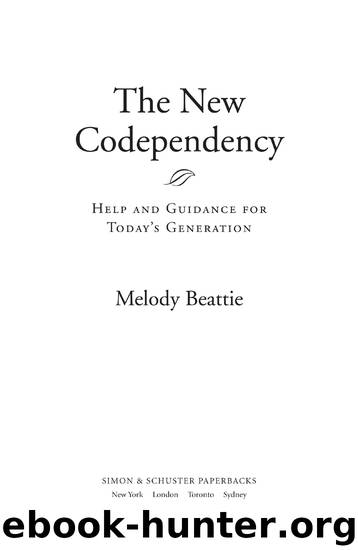The New Codependency by Melody Beattie

Author:Melody Beattie
Language: eng
Format: epub
Publisher: Simon & Schuster
14 . Nurturing
A WAY TO LOVE THAT WORKS
Nurturing wasn’t included in Codependent No More. I didn’t know what nurturing was when I wrote that book. Compartmentalizing fragmented me, and I lived a series of roles.
My roles as a child and teenager were: alcoholic, student, and family member. Until I was twelve and turned my back on Him, I was a child of God. Part of my identity was being sickly. Four times in my life I became deathly ill; twice illness kept me home from school for a year each time. I didn’t have “friend” as a role. Friends weren’t allowed. I didn’t know how to socialize. I was also a musician, studying classical music for thirteen years.
From the age of eighteen to twenty-four, I had one role—junkie. Then I became a recovering person on a spiritual path, legal secretary, and student getting my chemical dependency counselor degree. The roles shifted when I became a counselor. Then I added wife and mother to my roles. I had a child when I was a practicing drug addict, but I gave up custody of him. I didn’t know how to compartmentalize that, so I filed it—and my first divorce—under “guilt.”
The roles continued to shift. I became a reporter. Then I wrote my first book (with Carolyn Owens). It took two years. I made $900, amounting to twenty-one cents an hour. I returned to journalism, vowing never to write another book. When I understood how much codependency affected me and other people, I crossed off “never” and wrote Codependent No More. Gradually I became: author, speaker, single parent, woman, and recovering person. I was no longer a wife. Now, I had two divorces filed under “guilt.”
Compartmentalizing cut off my feelings.
As a child, I didn’t understand emotions, and even if I had, they weren’t allowed. I didn’t have time for them as an adult. Occasionally a feeling came along I couldn’t avoid. “You’re the only woman I know who doesn’t cry when she needs to,” a male friend said. When my marriage ended, I felt sad but didn’t cry. I grieved the loss and end of my marriage while I was still in it, like many women do. When I filed for divorce, my husband’s grief began. I was done feeling sad.
If we don’t feel, have never felt loved, lived according to roles, and weren’t nurtured, how could we know what nurturing is?
During my marriage, I was in so much pain from codependency (but not consciously feeling), I wasn’t present for my children the way I wish I’d been. Losing someone often makes us who we wish we were when the person was alive. I held Shane the first year of his life. I sensed how important each moment was. At ten months, he hit the ground running and didn’t stop until he died. Holding him was as close to nurturing as I came.
I wrote from the heart but didn’t consider myself an expert. When requests for media and speaking engagements arrived, I was in a dilemma.
Download
This site does not store any files on its server. We only index and link to content provided by other sites. Please contact the content providers to delete copyright contents if any and email us, we'll remove relevant links or contents immediately.
The 5 Love Languages: The Secret to Love That Lasts by Gary Chapman(9818)
Doing It: Let's Talk About Sex... by Hannah Witton(9284)
Should I Stay or Should I Go? by Ramani Durvasula(7673)
The Road Less Traveled by M. Scott Peck(7605)
The Lost Art of Listening by Michael P. Nichols(7507)
Daring Greatly by Brene Brown(6518)
Beartown by Fredrik Backman(5763)
We Need to Talk by Celeste Headlee(5617)
Men In Love by Nancy Friday(5246)
The Rules Do Not Apply by Ariel Levy(4972)
The State of Affairs by Esther Perel(4724)
How To Win Friends and Influence People by Dale Carnegie(4515)
Reflections Of A Man by Mr. Amari Soul(4294)
Pillow Thoughts by Courtney Peppernell(4286)
The Ethical Slut by Janet W. Hardy(4261)
Surrounded by Idiots by Thomas Erikson(4087)
Algedonic by r.h. Sin(4065)
He's Just Not That Into You by Greg Behrendt & Liz Tuccillo(3902)
I Love You But I Don't Trust You by Mira Kirshenbaum(3878)
